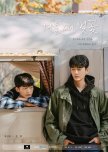Cette critique peut contenir des spoilers
Nothing new, but made very well: sweet and cute but serious enough
Cherry Blossoms After Winter does not score with a highly original plot. The story is simple, even predictable at times, but everything is put together so nicely that you might not want it to be any different.
The set-up is simple: Hae Bom is an orphan who is taken in by his mother's friend, Tae Sung's mother. Being the adopted child, he predictably knows his place and is grateful to Tae Sung's mother. One thing that I wasn't expecting, however, is how the supposedly good looking and popular guy (Tae Sung) is the one having a crush on the other guy (Hae Bom) first, and not the other way round. So while we the typical attractive but seemingly cold male lead, the story is not about how the supposedly less attractive and socially awkward guy has a crush on an attractive, practically unattainable guy.
The flashbacks to the leads' childhood time are brief but effective in showing their relationship and how their personalities have been shaped by their childhood experiences. At the same time, the way they transform each other is endearing, with Hae Bom becoming more sociable after Tae Sung opens up to him and Tae Sung becoming more cheerful.
One thing that this series does especially well is the way it suggests the undercurrents of homophobia in society that may get in the way of the leads' relationship, whether it is through the school bully who taunts them by calling them a gay couple (even before they are one) or through how Tae Sung only tells one friend, Yong Hee, about his love for Hae Bom even though he has more than one close friend. There is hardly anything original about this, but I could clearly feel the characters' awareness of the situation they are in and their latent pain, such as when they see a straight couple holding hands on campus but they can only walk together and remark that they, too, are a couple.
This is not a series that breaks new ground. It is very conventional in many ways, but everything comes together nicely. The acting is on point, the scenes are beautifully shot, and hardly any time is wasted on unnecessary dialogues or scenes. From early on, the characters are people we can care about and want to see having a happy ending.
The set-up is simple: Hae Bom is an orphan who is taken in by his mother's friend, Tae Sung's mother. Being the adopted child, he predictably knows his place and is grateful to Tae Sung's mother. One thing that I wasn't expecting, however, is how the supposedly good looking and popular guy (Tae Sung) is the one having a crush on the other guy (Hae Bom) first, and not the other way round. So while we the typical attractive but seemingly cold male lead, the story is not about how the supposedly less attractive and socially awkward guy has a crush on an attractive, practically unattainable guy.
The flashbacks to the leads' childhood time are brief but effective in showing their relationship and how their personalities have been shaped by their childhood experiences. At the same time, the way they transform each other is endearing, with Hae Bom becoming more sociable after Tae Sung opens up to him and Tae Sung becoming more cheerful.
One thing that this series does especially well is the way it suggests the undercurrents of homophobia in society that may get in the way of the leads' relationship, whether it is through the school bully who taunts them by calling them a gay couple (even before they are one) or through how Tae Sung only tells one friend, Yong Hee, about his love for Hae Bom even though he has more than one close friend. There is hardly anything original about this, but I could clearly feel the characters' awareness of the situation they are in and their latent pain, such as when they see a straight couple holding hands on campus but they can only walk together and remark that they, too, are a couple.
This is not a series that breaks new ground. It is very conventional in many ways, but everything comes together nicely. The acting is on point, the scenes are beautifully shot, and hardly any time is wasted on unnecessary dialogues or scenes. From early on, the characters are people we can care about and want to see having a happy ending.
Cet avis était-il utile?

 1
1 1
1

















